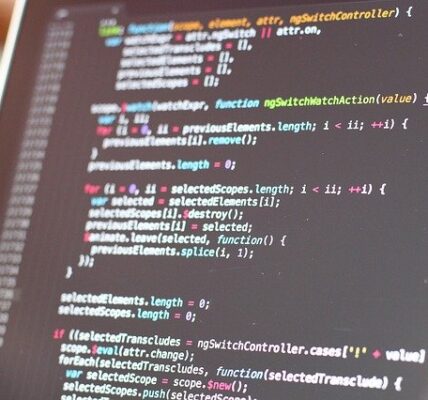The technology revolution has changed the way we look at the development process. ReactJS is one of the most popular JavaScript libraries, yet it is not without its challenges. This article aims to answer the fundamental questions of how much JavaScript knowledge one should possess to learn ReactJS. What is the difference between JavaScript and ReactJS, and what challenges arise from transitioning from JavaScript to ReactJS?
The industry trend is now to use powerful JavaScript frameworks such as ReactJS, Vue, and Angular, when it comes to creating dynamic user interfaces. However, this imposes significant challenges on developers who need to transition from using solely JavaScript to implementing ReactJS. A fundamental understanding of JavaScript and its functions are essential for a successful transition. Furthermore, a lack of JavaScript knowledge leads to difficulties with object-oriented programming concepts such as props, events, and lifecycle methods.
In this article, you will learn how much JavaScript knowledge one needs to successfully learn ReactJS. Different aspects of JavaScript that are required for a successful transition will be discussed. Additionally, this article will explore techniques to help make the transition from JavaScript to ReactJS smoother, as well as discuss the challenges faced when trying to learn ReactJS. By the end of this article, readers will have a better understanding of the complexities and differences between JavaScript and ReactJS and how to successfully transition.
Finally, tips and tools that can be used to help bridge the gap between JavaScript and ReactJS will also be highlighted. This article aims to provide a comprehensive overview of the complexities of transitioning from JavaScript to ReactJS and how to become proficient with both the languages. It is essential for developers to understand and make the most of the skills they possess as they transition to ReactJS, minimizing the challenges posed in this process.

Defining ReactJS and JavaScript
In order to understand the importance of knowing JavaScript when it comes to learning ReactJS, one must first understand the definition of both. JavaScript is a scripting language that can be used for creating interactive and dynamic web pages, while ReactJS is a JavaScript library used for building user interfaces (UI). ReactJS is also often referred to as a framework because it has pre-defined rules for how the code should be written.
In the early years of the internet, websites were limited in terms of the interactivity they allowed. JavaScript allowed web developers to create dynamic websites that could respond to user input, allowing for more elaborate and interactive web experiences. Nowadays, almost all websites use JavaScript and ReactJS in particular has been gaining traction in recent years.
Understanding the fundamentals of JavaScript is essential for being able to use ReactJS. JavaScript is a full-featured language that consists of complex syntax and allows web developers to create intricate logic. React on the other hand is merely a library or collection of components that can be used together in order to create UIs. In order to use React, one must first have a basic understanding of JavaScript.
Despite the complexity of JavaScript, learning the fundamentals is not as hard as one may think. It is mainly a matter of familiarizing with the language’s syntax and understanding the different concepts. Once one develops a basic understanding of JavaScript, they will be able to start learning ReactJS in no time.
Keyword: JavaScript
Learning ReactJS requires a fundamental understanding of JavaScript. Before diving into ReactJS, it is important to have a grasp of the basics of JavaScript. Being adept in the language is necessary in order to gain a comprehensive understanding of React and its components. To really get the most out of ReactJS, it is advised that one knows most of the language, including ES6 syntax and other advanced concepts.
Essential JavaScript Skills
It is important for developers to be knowledgeable of the core concepts that ReactJS is built upon. First and foremost, it is imperative to understand what is referred to as “vanilla” JavaScript; in other words, the basic principles of the language such as functions, variables, arrays, loops and data structures, and be comfortable with working with both plain JavaScript and JSX (the syntax React uses). Additionally, a good understanding of asynchronous JavaScript is needed; the primary purpose of this is to render components quickly and efficiently.
Advantages of Being Proficient in JavaScript
Familiarity with JavaScript is incredibly helpful for developers when working with ReactJS. Knowing JavaScript already puts developers several steps ahead, allowing them to hit the ground running and start building projects quickly. The language can be used to create basic components as well as utilize more advanced functionalities within an app.
Furthermore, proficiency in JavaScript can help with debugging. In the event of any issues, JavaScript developers will have the tools necessary to diagnose the situation and understand the context to spot the root cause.
It is also worth mentioning that knowing JavaScript can also open the doors to other frameworks such as Angular and Vue. Both of these libraries make heavy use of the language and exploit its features to create a coherent user experience.
Key Advantages of ReactJS
ReactJS is a great library for building dynamic user interfaces, featuring an official library of reusable components. This makes it easier for developers to create custom components and data structures rather than constantly having to reinvent the wheel.
ReactJS also takes advantage of the concept known as “data binding,” allowing developers to link HTML elements to JavaScript variables. This function speeds up the process of testing and debugging and in turn improves the overall efficiency of the code.
Moreover, its virtual DOM (Document Object Model) speed up rendering time and offers an immense performance boost. This is especially useful when creating complex, dynamic applications.
Conclusion
In summary, ReactJS is a powerful library used to create intuitive user interfaces. However, in order to really get the most out of it, it is important to be proficient in JavaScript. Having a basic understanding of the language is key in order to understand how React works and how to use it most effectively. Armed with the knowledge of JavaScript, developers will have the marketable and beneficial skills to take their development careers to the next level.
Becoming A JavaScript Expert To Conquer ReactJS
What Does It Take To Break Into ReactJS?
Everyone wants to learn how to develop cutting-edge websites with ReactJS, but what does it take to make that jump? Is a deep-rooted understanding of JavaScript a requisite to success? Or is a beginner-level knowledge of the language enough to get started? To answer that question, it is essential to measure the attributes and skills necessary for conquering ReactJS, and to understand how to apply practical knowledge for the best results.
Examining The Requirements for ReactJS Mastery
The main problem is that within the JavaScript programming language, there are so many distinct facets to consider when striving for competency. From classes and methods to variables and events, knowledge of the language is essential to program with ReactJS proficiently. Much of the development process with ReactJS is in the syntax, which needs to be exact in order to produce the desired results. For example, does the user need components or functions to complete the project? JavaScript allows for the fine-tuning of these necessary components, determing which ones are essential for the job, and which are not.
Putting it Into Practice
One way to ensure mastery of ReactJS is to have the necessary background and experience to correctly apply the principles behind the language. It is important to have a proper method of troubleshooting so errors can be quickly be identified in order for the code to be resolved. Experience with debugging skills, as well as knowledge of how to optimally structure code to ensure its scalable in the long run, is also necessary to successfully master ReactJS.
Having an aptitude for quickly processing the details of the language to create robust applications will substantially improve and expediate the development process. Following best practices, such as using validators and linting tools like ESLint to check the code for accuracy, would ensure the development process stays on track. Other practices, such as modularizing code, separating presentation from logic, and using clean syntax will guarantee that a ReactJS mastery can be achieved.
Navigating The Journey To ReactJS Mastery Through JavaScript Refinement
Are You Ready For ReactJS Mastery?
ReactJS is an increasingly popular JavaScript library that allows developers to create user interfaces with speed, ease, and efficiency. Although it is some individual’s experience and most popular opinion that basic knowledge of JavaScript is sufficient, ReactJS mastery requires refinement of JavaScript knowledge and experience.
The Main Problem
The main issue is that many novice developers with basic understanding of JavaScript attempt to tackle ReactJS without deep diving into understanding all the nuances of JavaScript language first. This often leads to a shallow initial understanding or failure to embrace the full potential that ReactJS has to offer. Inexperienced developers who are unable to build a strong foundation of JavaScript competency, such as variables, functions, scopes, loops and logic, are more likely to struggle and often stagnate.
Mastering Through JavaScript Refinement
Many experienced developers would advise that before embarking on the journey of ReactJS mastery, developers need to take the effort to refine their knowledge and understanding of JavaScript. Examples of refinement may include exploring the various paradigms such as Functional Programming (FP) and Object-orientated Programming (OOP), mastering the use of more advanced features such as Proxies and Proxy Handlers (public and private properties). Additionally, developers should also be familiar with design patterns and frameworks, e.g. MVC, coupled with other approaches and useful techniques to increase code scalability and maintainability.
Developers seeking to learn ReactJS must be willing to devote time to cultivate a greater understanding and mastery of the language of JavaScript. A more advanced comprehension of structures and patterns will give the developer increased insight and confidence when developing complex applications with ReactJS – an essential component of the journey to ReactJS mastery. Furthermore, experience in the programming as a whole should be a plus point – a good software engineer is one who strives to learn not only specific tools but also the general concepts and theory.
Conclusion
Making the transition from traditional JavaScript to ReactJS can feel like a daunting task. After all, ReactJS requires you to think differently about app development – embracing component-based architecture, and understanding the fundamentals of React’s Syntax Extension(JSX). So just how good at JavaScript do you need to be in order to learn ReactJS?
The answer really lies in how comfortable you feel with the basics of JavaScript. Are you able to write basic functions and utilize objects and variables with ease? Are you able to read and debug code? If so, you have a solid foundation in which to learn ReactJS. Of course, the more confident you feel with JavaScript, the easier the transition will be. However, even if you are comfortable with JavaScript but don’t feel like you know it inside out, you can still learn ReactJS with relative ease.
If you’re eager to get started on the learning journey, be sure keep up-to-date with the latest releases from ReactJS. Regularly check their blog and follow their Twitter page to receive announcements on the newest features and issues they are actively working on. The ReactJS team works hard to make sure they are answering questions and helping developers stay on top of their game.
Ultimately, the key to mastering ReactJS is a confident grasp of the basics of JavaScript and keeping up-to-date with the latest developments coming out of ReactJS. So why not take the plunge and see where your ReactJS journey takes you? After all, the only way to truly find out how good you should be is to test yourself. Who knows, you may find that you take to ReactJS like a duck to water!
F.A.Q.
Q1: How much JavaScript knowledge do I need before learning ReactJS?
A1: A basic understanding of core JavaScript concepts is necessary before learning ReactJS. Fundamentals such as variables, functions, conditionals, loops, data structures, and ES6 concepts should be well known to proceed with ReactJS. It is also helpful to understand some of the core features of web development such as HTML and CSS.
Q2: What resources can I use to help learn JavaScript?
A2: There are many free and helpful online resources available to learn JavaScript, including tutorial websites, online courses, books, and interactive coding websites. It also helps to participate in online coding communities and practice coding challenges to strengthen one’s knowledge.
Q3: What should I do if I get stuck while learning ReactJS?
A3: If you get stuck while learning ReactJS it is important to have the right resources to help troubleshoot. It can be helpful to search online for solutions or post a question in an online message board or support forum. Online ReactJS communities are great resources to find answers to any ReactJS related question.
Q4: How long does it take to learn ReactJS?
A4: The amount of time it takes to learn ReactJS varies depending on a person’s familiarity with web development concepts and JavaScript. Generally, it takes a few months of dedicated practice and consistent troubleshooting to develop a strong understanding of ReactJS.
Q5: Is ReactJS difficult to learn?
A5: ReactJS can be difficult to learn for developers who are new to web development since it requires a strong understanding of JavaScript, HTML, and CSS. It can be helpful to start with small projects and work through them one step at a time to learn ReactJS efficiently. It is also important to set achievable goals and have a growth mindset to be successful in learning ReactJS.



